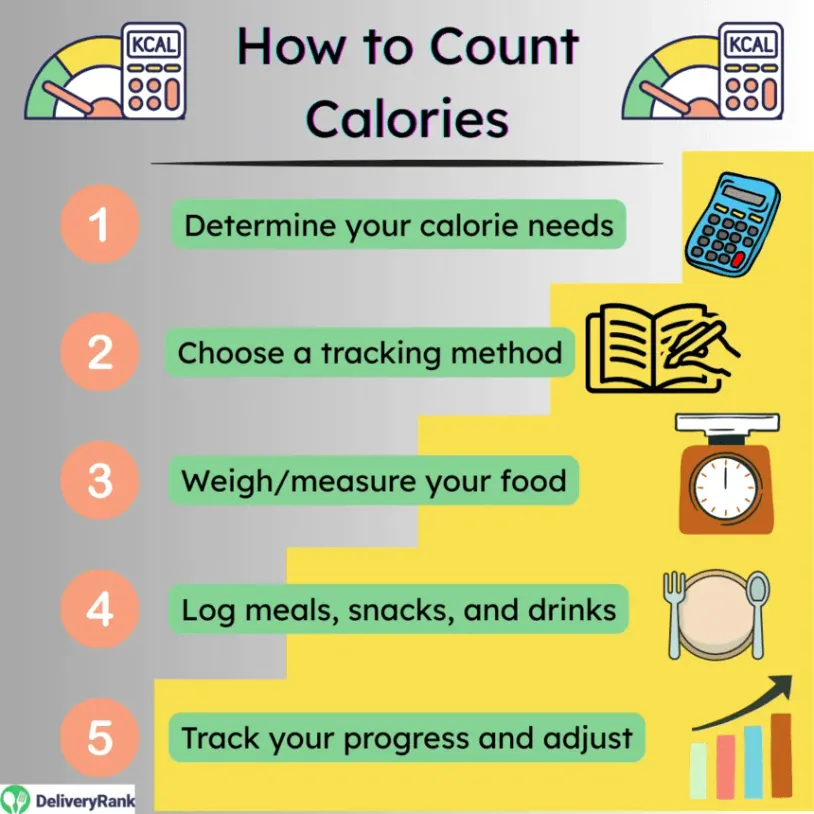The Truth About Counting Calories 2026: What Actually Works

Counting calories sounds simple enough. Eat less than you burn, right? But in reality, it’s rarely that straightforward. Labels can be wrong, portion sizes are tricky, and tracking every bite can quickly turn from helpful to overwhelming.
Strict calorie tracking also has its downsides. It can lead to obsession, stress, and a focus on numbers over nutrition quality. You might hit your calorie target but still miss out on important nutrients your body needs to actually feel good.
Modern eating habits don’t make things easier either. Between meal delivery kits, eating out, and the occasional late-night snack at home, tracking every calorie with precision takes serious time and energy – and most of us just don’t have that kind of bandwidth.
The good news is you don’t have to track every calorie to manage your weight or stay healthy. Unless you have a specific weight or fitness goal, simple, low-stress strategies can help you stay on track without making food feel like a math project.

What Are Calories? 🧮
Calories are simply a way to measure energy1. Your body needs energy to do everything – from running marathons to scrolling on your phone. When you eat food, you’re giving your body the fuel it needs to function, grow, and repair itself.
Each macronutrient provides a different amount of calories:
Macronutrient | Calories per Gram |
Carbohydrate 🌾 | 4 calories |
Protein 💪 | 4 calories |
Fat 🥑 | 9 calories |
Alcohol 🍷 | 7 calories |
That’s why high-fat foods like cheese, nuts, and oils pack more calories into smaller portions. Fat is essential for your health, but it’s easier to overeat without realizing it. This can lead to weight gain over time.
Your body also burns calories even when you're doing absolutely nothing. This is called your Basal Metabolic Rate (BMR) – basically, the number of calories you'd burn if you stayed in bed all day. BMR is influenced by things like your age, weight, height, and muscle mass.

On top of that, your daily calorie needs depend on how much you move. Sitting at a desk all day burns fewer calories than working on your feet or doing regular workouts. That’s why most calorie calculators ask about your activity level. This gives you a better estimate of how much fuel your body actually needs.
Why Is It Important to Count Calories? 🤔
People track their calories for a variety of reasons. It’s not just about the numbers – it’s about making mindful choices to support your goals and health. Here are some common reasons why people might choose to count calories.
Reason | What It Helps With |
Weight Loss 🏃♀️ | Creating a calorie deficit and managing portion sizes |
Weight Maintenance ⚖️ | Staying within a consistent range without overeating |
Muscle Gain 💪 | Ensuring you're eating enough calories and protein for muscle growth |
General Health Awareness 🥦 | Making informed choices about what you eat and how it affects your body |
Managing Medical Conditions 🩺 | Tracking carbs and calories to manage conditions like diabetes |
Improving Athletic Performance 🏋️♀️ | Fueling workouts and optimizing energy levels for better performance |
Identifying Food Sensitivities 🍞 | Noticing patterns with symptoms like bloating or fatigue |
Building Better Eating Habits 🍎 | Creating mindfulness around portions and food quality |
Following a Specific Diet 🍽️ | Sticking to plans like keto, paleo, or intermittent fasting |
How To Count Calories: A Step-By-Step Guide 🪜
Counting calories doesn’t have to be complicated. Follow these simple steps, and you’ll have a clearer picture of how to manage your intake.


Start by figuring out how many calories your body needs each day. Use a TDEE (Total Daily Energy Expenditure) calculator to estimate this. It takes into account your Basal Metabolic Rate (BMR) and your activity level. This will give you a rough idea of how many calories you should aim for to meet your goals (weight loss, maintenance, or gain).
2. Choose a Tracking Method 📱
Pick a method that works for you. You can use a journal or a calorie-tracking app (like MyFitnessPal or Cronometer) to log your food. Apps make it easy by scanning barcodes and suggesting portion sizes. If you prefer old-school pen and paper, a journal will work just as well.
3. Weigh/Measure Your Food 🥄
To track accurately, you'll need to weigh or measure your food. A kitchen scale is great for precise measurements, and measuring cups/spoons can help with portions. It might seem tedious at first, but it gives you a clearer idea of what you're actually eating.
4. Log Meals, Snacks, and Drinks 📓

Don’t forget about everything that passes your lips. This includes snacks, drinks, and sauces. It’s easy to forget small things like a splash of olive oil or a handful of nuts, but they can add up. Be thorough and log everything, including any condiments or extras you add to meals.
5. Track Your Progress and Adjust 🔄
After tracking for a while, you’ll have enough data to see patterns. If you’re not hitting your goals, adjust your calorie intake or exercise routine accordingly. It’s all about fine-tuning and finding what works best for you.
Why Counting Calories Can Be Challenging 😟
While counting calories can be helpful, it’s not always straightforward.
Tracking ingredients at home can be time-consuming: Measuring and weighing every ingredient can quickly become overwhelming. Small additions like oil or sauce can be easily overlooked.
Food packaging can be off by 20%: Food labels can often be inaccurate by up to 20%2. To mitigate this, it's best to stick to 1 tracking method or app consistently, even if it’s slightly off. Switching brands can make calorie estimates more inconsistent.
Dining out adds hidden calories: Restaurant portion sizes are often larger than expected, and you can't always control how much oil or butter is used. Plus, most places don’t provide calorie breakdowns.

Eating out often leads to higher calorie intake Portion sizes are often underestimated: It’s easy to underestimate portions, especially when eyeballing food. Using a kitchen scale or measuring cups gives you a more accurate idea of what you're really eating.
The same dish can have different calorie counts: The calories in a dish can vary based on ingredients, portion sizes, and cooking methods. Tracking raw ingredients (including oils and seasonings) is the best way to be accurate, but it’s trickier if someone else is cooking.
Calorie burn varies between individuals: Metabolism, activity level, and even digestion play a role in how many calories your body absorbs3. This means that even if you track everything perfectly, your calorie intake might not be the same as someone else’s.
Smart Tips for Counting Calories 🧑🍳

1. Use a Digital Scale to Weigh Ingredients ⚖️
A digital scale is your best friend when it comes to accuracy. Weighing your food gives you precise measurements, so you don’t have to guess portions. This is especially helpful for foods that don’t come in easy-to-portion sizes, like vegetables, grains, or proteins. With just a few seconds of extra effort, you’ll have a much more accurate calorie count.
2. Batch Cook & Pre-Portion Meals 🍱
Make large batches of food and divide them into pre-measured portions. This saves you time and mental energy during the week. By portioning out your meals, you’ll always know exactly how many calories you’re eating. This also helps you avoid overeating when you're tired or in a rush.
3. Choose Simple Recipes to Make Tracking Easier 🥗

The simpler the recipe, the easier it is to track. Stick to recipes with fewer ingredients, and try to use whole foods whenever possible. This reduces the chances of missing hidden calories in complicated dishes, making it easier to log everything accurately.
4. Consider Your Cooking Methods 🔥
Cooking methods can affect the calorie content of your meals. For example, frying food adds extra calories from oils, while steaming or grilling usually adds fewer calories. Always be mindful of how you prepare your food. It's not just about what goes into the pot, but also how it's cooked.
5. Keep a Record of Homemade Meals on a Tracking App 📲
Tracking apps allow you to log homemade meals accurately. They even have large food databases, so once you've input a recipe, you can reuse it, saving you time. Tracking apps also help you stay consistent, which is key when you’re trying to manage your calorie intake.
Counting Calories for Weight Loss 📏
When it comes to weight loss, creating a calorie deficit is the key. But what does that really mean?
A calorie deficit occurs when you consume fewer calories than your body needs to maintain its current weight. Essentially, your body starts burning stored fat for energy, leading to weight loss. To make this happen, you need to track your intake and ensure you're eating fewer calories than you burn. It’s a simple concept, but not always easy to stick to day after day.

When you’re aiming to lose weight, setting realistic, measurable goals can make a big difference. Whether it’s losing a few pounds a month or fitting into a favorite pair of jeans, having a clear target keeps you motivated. A sustainable goal is usually around 1-2 pounds of weight loss per week, which typically means a daily calorie deficit of 300-500 calories.
Tracking your progress is important, too. Using a calorie calculator or tracking app can help you estimate how many calories you should be eating and monitor your daily intake. You can also track your weight over time and adjust your calorie intake if needed.
How to Make Healthier Food Choices 🍴
It’s important not to focus on calorie count alone when choosing foods. Calories are just one piece of the puzzle. Let’s explore other important factors that contribute to a healthier, more balanced diet.

Focus on nutrient density 🥦: Choose foods rich in vitamins and minerals like leafy greens, fruits, lean proteins, and whole grains. They help you stay healthy and meet calorie goals without sacrificing nutrition.
Prioritize satiety 🍽️: Pick fiber- and protein-rich foods to stay fuller for longer and avoid overeating.
Fuel your energy 🏋️♀️: Balanced meals with carbs, protein, and healthy fats keep you energized and performing your best.
Support blood sugar control 🍬: Eat whole foods like whole grains and veggies to prevent energy crashes and cravings.
Boost gut health 🦠: Fiber-packed foods help digestion, support immunity, and keep your metabolism running smoothly.
While focusing on nutrition is important, eating should also be an enjoyable experience. Savoring your meals and choosing foods that make you happy is essential for long-term success. Healthy eating is about balance, not restriction, so allow yourself to enjoy your favorite foods in moderation.
A Sustainable Approach to Counting Calories 🔁
Counting calories doesn’t have to be rigid or stressful. The key to making it sustainable is focusing on long-term habits that you can maintain without feeling deprived. Here are some practical strategies that can help you stay on track while keeping things flexible and enjoyable.
Strategy | Description |
Eat smaller portions – use smaller plates 🍽️ | Using smaller plates helps naturally limit portion sizes. It makes meals look bigger, helping you feel satisfied even with less food, supporting your calorie goals. |
Focus on eating nutrient-dense whole foods 🥑 | Did you know that nearly a third of calories in the average diet come from junk food?4 Prioritize vegetables, fruits, lean proteins, whole grains, and healthy fats. Avoid highly processed foods, which are often high in calories but low in nutrients. |
Prioritize protein & fiber to stay fuller for longer 🍗 | Protein and fiber slow digestion, helping you stay full between meals. Include sources like eggs, tofu, veggies, beans, and whole grains with every meal. |
Use the plate method5🍽️ | Fill half your plate with non-starchy vegetables, a quarter with lean protein, and a quarter with whole grains or healthy carbs to naturally balance portions and nutrients. |
Make simple ingredient swaps 🔄 | Small changes make a big difference: swap white bread for whole grain, Greek yogurt for sour cream, and baked options for fried foods to lower calories. |
Practice the 80/20 rule ⚖️ | Focus on eating nutrient-dense, healthy foods 80% of the time, and allow 20% for treats6. This flexible approach makes calorie counting more sustainable and enjoyable. |
What About Meal Planning? 📃
Meal planning is a simple way to stay on track with your calorie goals. It also helps you save time and stress.

Here’s why it works:
Know what you're eating 🗓️: Plan your meals ahead to avoid last-minute decisions and ensure a balanced diet.
Prep in bulk & pre-portion 🍱: Batch cook meals and portion them out for easy, calorie-controlled servings.
Consider the whole family 👨👩👧👦: Plan meals everyone will enjoy and accommodate different dietary needs.
Factor in time & schedules ⏰: Choose recipes that fit your available time and busy family routines.
How Meal Delivery Services Make Calorie Tracking Easier 🥡
Meal delivery services can be a game-changer when it comes to managing calorie intake.

Here’s how they can make calorie tracking a whole lot easier:
Pre-portioned, labeled meals reduce guesswork 📦: Meals come with calorie labels, removing the need for weighing or measuring.
Options for different calorie goals 🎯: Choose meals based on your goal: weight loss, maintenance, or muscle gain.
No need to weigh or measure ingredients ⚖️: Some meal delivery services offer prepared meals with calories already calculated – just heat and eat. Others provide meal kits with portioned ingredients, so you can cook without the hassle of measuring.
Learn portion sizes and apply them to home-cooked meals 🍽️: Meal delivery helps you learn correct portion sizes for when you cook.
Use meal delivery for structure 🗓️: Set a baseline for your calories and plan the rest of your day around it.
Mental Health and Healthy Eating: Finding Balance 🧘
Balancing your mental health with healthy eating is important. It's key to maintaining a sustainable approach to food.

Here’s how you can do it:
💖 Practice self-compassion: Don’t beat yourself up over food choices. Allow flexibility and be kind to yourself, even on days when things don’t go as planned.
🎯 Set realistic, flexible goals: Create goals that are achievable and flexible enough to include enjoyable foods without guilt.
⏳ Focus on long-term habits: Instead of obsessing over daily calorie tracking, focus on building lasting habits that support your overall health.
🛑 Take breaks from tracking: Regular breaks from tracking prevent burnout and help maintain a healthy relationship with food.
🍽️ Embrace intuitive eating: Listen to your body’s hunger cues, and focus on how foods make you feel rather than calorie counting.
🤗 Cultivate a supportive environment: Surround yourself with people who encourage positive eating habits and emotional well-being.
📅 Focus on weekly averages: Instead of stressing over daily calorie totals, aim for a balanced approach with weekly averages to reduce pressure.
FAQ
Is calorie counting a good way to lose weight?
Calorie counting can help create a calorie deficit for weight loss, but it shouldn’t be the only focus. It’s also important to consider food quality, portion control, and balanced habits. While it can be effective, it’s essential not to become overly obsessed with numbers for sustainable results.
What is the proper way to count calories?
Use a reliable app or journal to track everything you eat, including drinks and snacks. Weigh or measure your food for accuracy. Track your meals consistently and review your progress regularly. Check out our handy step-by-step guide for more details.
How do I calculate my calorie intake?
To calculate calorie intake, use a Total Daily Energy Expenditure (TDEE) calculator. This gives you the calories needed to maintain weight, considering factors like activity level. For weight loss, subtract 300-500 calories from your TDEE, and for weight gain, add calories to your TDEE, focusing on nutrient-dense foods.
How to count calories when using a meal delivery service?
Meal delivery services often provide detailed calorie counts for each meal. Use their nutrition labels or app to track calories. If you customize meals or add extra ingredients, be sure to account for those additions. Many services also offer meals tailored to specific calorie goals, making tracking easier.
How to count calories without getting obsessed?
Count calories without obsession by focusing on consistency, not perfection. It’s important to find a balance. Track the basics, like meals and snacks, and take breaks when needed. Prioritize nutrient-dense foods and listen to hunger cues. Tracking should be a tool for awareness, not a source of stress, and shouldn’t dominate your eating habits.
References
1. https://www.ncbi.nlm.nih.gov/books/NBK499909/
2. https://www.fda.gov/regulatory-information/search-fda-guidance-documents/guidance-industry-guide-developing-and-using-data-bases-nutrition-labeling
3. https://pmc.ncbi.nlm.nih.gov/articles/PMC11676201/
4. https://www.sciencedirect.com/science/article/abs/pii/S0889157504000328
6. https://www.omicsonline.org/open-access/8020-diet-efficacy-in-regard-to-physiology-and-psychosocial-factors-2165-7904-1000357-97315.html


- Summary
- What Are Calories? 🧮
- Why Is It Important to Count Calories? 🤔
- How To Count Calories: A Step-By-Step Guide 🪜
- Why Counting Calories Can Be Challenging 😟
- Smart Tips for Counting Calories 🧑🍳
- Counting Calories for Weight Loss 📏
- A Sustainable Approach to Counting Calories 🔁
- Mental Health and Healthy Eating: Finding Balance 🧘
- FAQ
- References




